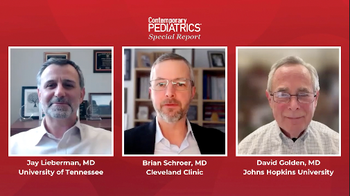
Ethical practice when facing life-limiting disease
There are resources and guidelines available for pediatricians faced with caring for children with terminal or life-threatening conditions.
Pediatricians confronted with helping patients and families make sense of difficult healthcare diagnoses and treatments have places and people to turn to for help, according to pediatrician and bioethics expert Brian Carter, MD.
There are pediatric-specific bioethics centers, including at Children’s Mercy Kansas City, Missouri, as well as the Treuman Katz Center for Pediatric Bioethics at Seattle Children’s Hospital, University of Washington, Seattle, says Carter, who is the endowed William T. and Marjorie Sirridge Professor in Medical Humanities and Bioethics at the University of Missouri-Kansas City School of Medicine and codirector for the Children’s Mercy Bioethics Center’s Pediatric Bioethics Certificate Course. Carter also is a board member for the Center for Practical Bioethics, a nonprofit, independent organization in Kansas City, Missouri, started in 1984 to help patients, families, healthcare professionals, and policymakers deal with complex issues in medicine.
“There are pediatric bioethicists sprinkled throughout the United States,” Carter says. “There is within the American Academy of Pediatrics (AAP) both a Section on Bioethics and a Section on Hospice and Palliative Care.”
Pediatricians could also refer to adult bioethics centers, which might not be pediatric specific but tend to offer some knowledge or capacity to deal with pediatric issues, according to Carter. “People are generally in this field to be helpful,” he says.
There also are resources such as the Center for Practical Bioethics, as well as guidelines to help pediatricians and others grapple with ethical issues.
Ethical guidelines for children
The essence of what pediatricians need to know about the ethics of caring for children when dealing with life-limiting or life-threatening conditions is addressed in the Healthcare Treatment Decision-Making Guidelines for Minors, by the Center for Practical Bioethics, first published in 1995 and revised in May 2015.
“Realistically, what this translates to for the general pediatrician is that when considering life-limiting or life-threatening conditions for children who have a voice, that voice should be heard,” Carter says. “The longstanding history here in Kansas City is with the late William G. Bartholome, MD, a physician and ethicist who promoted the identity of the child as being very important when making treatment decisions and when pursuing procedures on the child.”
Parental permission, generally under the guise of consent, should be accompanied by the child’s assent. The child should be respected as an individual and given the opportunity to understand what the treatment is and what needs to be done and why, according to Carter.
“That effort was in one sense codified in the writings of the AAP in the 1990s, as they addressed issues of informed consent and assent for the care of children,” Carter says. “This revolves, again, around respect for the child as a maturing young person, separate from his or her parents, who warrants that respect from healthcare professionals.”
For babies, toddlers, and other children who don’t have the capacity to participate in decision-making, the provider is in a situation where he or she can posit potential options for care, comfort, and quality of life, according to Carter.
“In essence, the pediatrician is saying to the parent, you’re not alone here, I’m going to walk you through this space and give you examples of decisions that you might not have thought of that other loving parents have made,” he says. “It’s not that a pediatrician takes on the voice of the child. More times than not, that is really the prerogative of the parents to try to determine what would be in the child’s best interests. The best interests of the child concept is usually relegated to parents, unless they’ve shown that they’re not interested in that and they perhaps are neglectful or otherwise have perpetrated harm on the child.”
Pediatric bioethicists, pediatricians who are interested and in the know about these things, and other bioethics experts can help walk pediatricians through these and other difficult conversations with patients and families, says Carter.
Newsletter
Access practical, evidence-based guidance to support better care for our youngest patients. Join our email list for the latest clinical updates.



